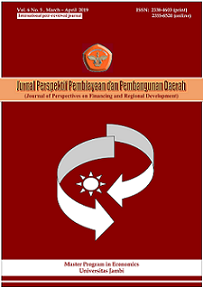Determinant of the quality of the national financial audit report: study at National Auditor Board Jambi Province
DOI:
https://doi.org/10.22437/ppd.v6i5.6588Abstract
This study aimed to examine the effect of training, experiences, gender, age and educational background possessed by the auditor on the quality of State Financial Audit results. This research used secondary data provided by Audit Board of the Republic of Indonesia Representative of Jambi Province in the form of 2016 and 2017 staffing data and Audit Reports. Multiple linear regression analysis was used for the analysis method. The study results found that the quality of the state financial audit was affected by experiences. However, the study failed to find the influences of age, education, and gender on the quality of state financial audit results. It provides empirical evidence that the auditor's ability to find and reveal findings has been influenced by experiences of the auditor
Downloads
References
Ghozali, I. (2011). Aplikasi Analisis Multivariate dengan Program IBM SPSS. Semarang: Badan Penerbitan Universitas Diponegoro.
Irianto, G., (2003), Skandal Korporasi dan Akuntan. Lintasan Ekonomi. XX(2), 104-114.
Sabrina & Januarti, I., (2012), Pengaruh Pengalaman, Keahlian, Situasi Audit, Etika, dan Gender terhadap Ketepatan Pemberian Opini Audit melalui Skeptisme profesional Auditor (Studi Kasus pada KAP Big Four di Jakarta). Proceeding. Simposium Nasional Akuntansi XV, Banjarmasin.
Jayathilake, P.M.B., (2013), Gender Effects on Risk Perception and Risk Behavior of Entrepreneurs at SME’S in Sri Lanka. Asia Pasific Journal of Marketing & Management Review. 2 (2), 1 – 11
Johnie, P., (1993), Formal Education: A Paradigm of Human Resource Development. The International Journal of Educational Management. 7 (5), 4-8.
Pandoman. (2014) Penyelesaian Utang BLBI dalam Kajian Hukum Responsif dan Represif. Yogyakarta: Penerbit Jawara.
Riley, W.B., & Chow, K. V. (1992). Asset Allocation and Individual Risk Aversion. Financial Analysts Journal, 48 (6), 32-37.
Rukmawati, A.D., & Chariri, A. (2011). Persepsi Manajer dan Auditor Eksternal Mengenai Efektivitas Metode Pendeteksian dan Pencegahan Tindakan Kecurangan Keuangan. Dissertation. Universitas Diponegoro.
Setyaningrum, D. (2012). Analisis Faktor-Faktor yang Mempengaruhi Kualitas Audit BPK RI. Paper. Simposium Nasional Akuntansi (SNA) XV. IAI. Banjarmasin.
Sukriyah, I., & Inapty, B. A (2009). Pengaruh Pengalaman Kerja, Independensi, Obyektifitas, Integritas, dan kompetensi terhadap Kualitas Hasil Pemeriksaan. Paper. Simposium Nasional Akuntansi (SNA) XII. IAI. Palembang.
Widiarta. (2013). Pengaruh Gender, Umur Dan Kompleksitas Tugas Auditor Pada Kualitas Audit Kantor Akuntan Publik di Bali. E-Jurnal Akuntansi. 3(1), 109-118.
Wirosari, T.R., & Fanani, Z. (2017). Pengaruh Umur, Gender, dan Pendidikan terhadap Perilaku Risiko Auditor dalam Konteks Audit atas Laporan Keuangan. Jurnal Ekonomi dan Bisnis Airlangga (JEBA)| Journal of Economics and Business Airlangga. 27(1).
Downloads
Published
How to Cite
Issue
Section
License
Copyright (c) 2019 Yudi Yudi, Sri Rahayu

This work is licensed under a Creative Commons Attribution 4.0 International License.

















